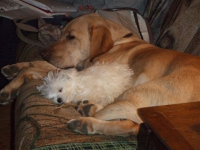Veterinarian Surgical Services
Porcupines are very prevalent in our area and dogs (and some cats!) can't seem to resist going to check them out. Porcupines cannot throw their quills, so the dog must get close enough to touch it. Most of the time, the dog may only have a small number of quills, but we have seen many with hundreds. The quills have microscopic barbs on the tips that allow them to work their way deeper into the dog's skin. If your dog has less than ten quills, you may be able to pull them out by grasping them close to the skin with pliers and pulling straight out. If your dog has a lot of quills or may try to bite as you remove them (it can be painful), then bring them in immediately to us or an emergency veterinarian for removal under anesthesia. The longer they stay in, the more likely they are to break off under the skin and cause infections and problems later.
An abscess is a collection of pus in any part of the body that, in most cases, causes swelling and inflammation around it. It is common that a bite wound, laceration, or other puncture that then becomes infected causes the abscess. If the abscess is not open and draining, surgery may be needed to allow the pus to drain out and for us to clean the wound thoroughly. Keeping the wound clean until it heals is very important. We will send you home with an antiseptic soap, antibiotics, and usually, pain medication. If the pet allows, the wound should be gently massaged, flushed and cleaned at least twice daily as long as there is visible discharge. Do not hesitate to call if your pet has a wound. Prompt treatment can prevent serious complications.
Wounds can occur for a variety of reasons from simple cuts/lacerations to bite wounds to extensive wounds from being hit by a car. Some of these can be managed medically, but often they require surgery to repair the damage and promote faster healing. The sooner we are able to evaluate and repair these wounds, the better the wound will heal. Older wounds will become contaminated with bacteria and the tissue will be dried out meaning that more extensive cleaning and removal of dead tissue will be necessary. Wounds involving joints, tendons or body cavities can necessitate referral for intensive care or surgery performed by a board-certified surgeon.
The most common reason for performing surgery on the bladder is to remove uroliths, or bladder stones. These are very common in certain breeds of dogs (Miniature Schnauzers, Bichons, Shih Tzu, Dalmation, etc) and can lead to blockages of the urethra preventing urination. This is an emergency that needs to be addressed immediately. Dogs and cats that are "blocked" are straining to urinate but little to no urine is produced. We often diagnose bladder stones during the work-up for a bladder infection. Animals that are prone to bladder stones are often put on a special diet to help prevent the formation of these stones.
Exploratory surgery entails entering one of the body cavities, usually the abdominal cavity, in order to determine the cause of a medical problem. Most commonly, we are looking for foreign bodies (ie bones, socks, toys, etc.) that an animal has swallowed and are now stuck in their stomach or intestines. Exploratory surgery is also used to get biopsies of internal organs or masses. It is a major surgery and usually includes a hospital stay and intensive care.
A "lumpectomy" is essentially the surgical removal of a mass of the skin or subcutaneous tissue. This requires anesthesia in the vast majority of cases. Many of these masses may be benign (meaning not life-threatening to the pet), but this can often not be determined until the mass is examined by a pathologist.
A biopsy is a medical test involving sampling of cells or tissues for examination. This usually entails pre-anesthetic testing and anesthesia in order to get an adequate sample to submit to the laboratory. In some cases, we may choose to do a needle aspiration while the animal is awake to get a small sample to examine here in the hospital. This quick test can help us to determine if further treatment or surgery is necessary. Occasionally, we may need to send your pet to a local referral hospital for the biopsy if the surgery is especially complicated.




















